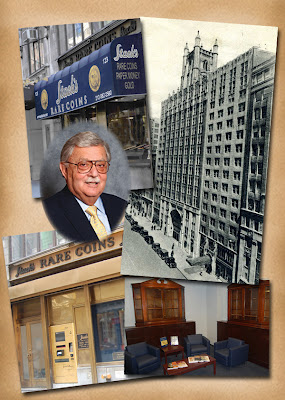
On August 23, 2012 when we celebrated the refurbished store, it was just about 60 years since Stack’s relocated from its store and offices on West 46th Street in New York City to its present location. I was given the honor of making the opening remarks about our famous, long time coin shop in midtown New York City, found just a short walk from Fifth Avenue at 123 West 57th Street.
Stack’s new location became almost a mirror image of their earlier location — a spacious showroom, with glass and walnut sit down counters, coins on display for collectors to browse and select from, numismatic and educational wall displays to inform and entertain the visitor, and special lighting to see the items being offered. Stack’s also offered a staff of educated and trained numismatists to examine coins being brought in for sale and provide information to the buyers of the importance of what they were shown.
To make those visiting most comfortable, air conditioning, especially in the summer months, was always maintained. Those waiting to be served could find a seat at the counters or rest on a comfortable couch in the fore part of the showroom. The walls had racks of numismatic books and collector albums, which could be looked at, selected from, and acquired for personal use. Overall, it was a warm and comfortable place to visit and study coins. If special knowledge was required, a vast library was available for in-house research.
Collectors met each other at Stacks, whether during working hours or on Saturdays or holidays, and sat about discussing coins of interest with fellow collectors and the super staff that Stack’s always employed. Our staff could answer questions in all fields, from ancient times to the modern, and many specialists who had academic ambitions worked for Stacks before going out on their own. We had great catalogers, and graduates from our staff scholars included Cornelius Vermuele, who became curator at the Museum of Fine Arts in Boston; Dr. and Mrs. Clain Steffanelli, who became curators at the Smithsonian Institute in Washington, D.C.; Henry Grunthal, who became Curator at the American Numismatic Society in New York, and many others.
I have been active in this firm since 1947 and enjoy every moment I can be at the store to greet old friends and collectors, as well as the newer generations coming on.
I will include a short review of some of the accomplishments of the Stack family, which originally consisted of Morton and Joseph B. Stack. Later came Joseph’s sons, Benjamin and Norman, and Morton’s son, myself, Harvey G. Finally, in the early 1970s, my son, Lawrence, joined the firm. The two senior Stacks passed away by the 1980s, my cousins Ben (in 1983) and Norman (in 1992), leaving Larry and myself to conduct the workings of the firm. We had wonderful help from my daughter Susan for some 30 years from 1976, and we had a very devoted staff that helped make things happen.
It was in 1935 that Stack’s conducted its first auction, with some 800 more to follow through today. We of course are known for buying and selling some of the great collections, many times selling parts or all at public auction. We bought the Clapp collection and sold it to Louis E. Eliasberg, who assembled the most complete collection of U.S. gold, silver and copper coins ever formed. We bought sections of the Col. E.H.R. Green collection, and sold part to King Farouk of Egypt, and another portion to the renowned collector J.K. Lilly of Indianapolis. We sold for numerous private collectors and for museums and libraries nationwide, and had a reputation of skillful cataloging and record sales.
The famous and noteworthy collections Stack’s sold in the years gone by include the famous Clapp collection, mentioned earlier, as well as the estates of David Prosky, Anderson- Dupont, Davis-Graves, R. L. Miles, Samuel Wolfson, Fairbanks, Holmes, Empire (C.A. Cass), Harold Bareford, John Roper, Dr. Bolt, Richard Picker, Robison, Herb Oechsner, The Dallas Bank, Amon Carter, Reed Hawn, James Stack (no relation), Floyd Starr, Lester Merkin, Hain, Charles French and hundreds of others, often setting records at the time of each auction, The largest single owner sale, the John J. Ford Collection, sold in 21 volumes, realized over $53 Million sold during the early years of this century.
The largest, most important collection of gold coins ever assembled, consisting of a virtual complete collection of U.S federal and territorial gold, ancient and world gold from as early as 700 B.C. to the 20th century, and consisting of over 6,000 specimens, was assembled for Josiah K. Lilly, of the Eli Lilly Pharmaceutical firm, over a period of 17 years, from 1951 to 1967. It was considered so important that it was acquired by an Act of Congress in 1967, after his death, for over $5.5 million, and placed in the Museum of American History at the Smithsonian Institution, as a major part of the National Numismatic Collection. The collection was assembled in complete secret, at Mr. Lilly’s request, and its existence was not revealed until it was transferred to the Smithsonian. It is currently valued in excess of $125 million, and scholars feel it couldn’t be duplicated for that amount. The Stack family is proud of our role in this achievement.
Stack’s also holds the record by joining with Sotheby’s in selling the famous 1933 $20 gold double eagle at public auction for a record price of $7,500,000 in 2002. The famous “Coin Shop on 57th Street” was always a gathering place for numismatists, young and old, and many collections through the decades were started within our "doors" and were offered for sale through our retail offerings and our famous Public Auctions.
I am proud to be part of this refurbishing and re-establishing of the tradition that the Stack family has always tried to maintain. Whenever you are near our shop please come by and say "hello.” We sincerely welcome you!





